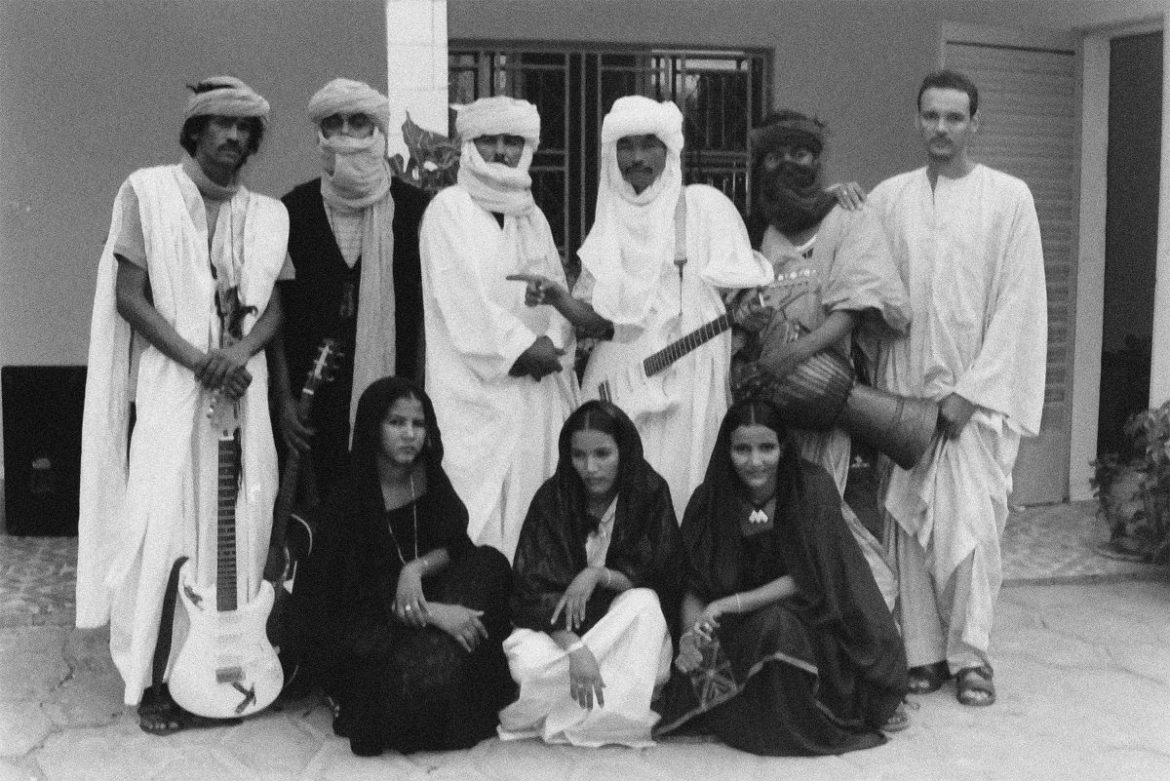Tinariwen announce a new unreleased & rarities album Idrache (Traces Of The Past), out November 15 via Wedge. Today they share the lead single ‘Amoss Idjraw’, written by the band’s founding member Ibrahim Ag Alhabib, and originally recorded in Kidal, Mali in January 2006. The album follows an extensive 2024 world tour, which featured sold out shows headlining venues and festivals such as Newport Folk Festival, BBC Proms (Royal Albert Hall), Sydney Opera House, Elbphilarminie in Hamburg, Dubai Opera House, and more, in support of their last studio album Amatssou.
Idrache (Traces Of The Past) features a dozen hidden gems from the Sahara. Rough hewn, but intimate and beautiful recordings by Tinariwen, the world’s most famous Tuareg band. Some are demos that were later released in more produced versions on subsequent albums and four of them have never been released before. This is music to transport you, music that makes you feel you are in the Sahara with these extraordinary musicians for whom it is their home and their inspiration. These are raw desert treasures, recorded live with no overdubs, that are only emerging into the sunlight with this album of rarities, Idrache (Traces of the Past).
With their long desert robes and Tuareg turbans or shesh, Tinariwen are the originators of what’s become known as ‘desert blues’, a style of music they themselves call ‘assuf’ which also means ‘longing’ or ‘homesickness’ in the Tamasheq language. Exchanging Kalashnikovs for guitars after participating in the 1990 Tuareg rebellion, Tinariwian really are rock ’n’ roll rebels, drawing people into their growling vocals, spacey guitar lines and clapping rhythms. Over the past two decades, they’ve been popular and regular guests at festivals all around the world where they’ve done a lot to raise awareness about Tuareg culture and identity.
The songs on this album were recorded in 2002, 2006 and 2008, the first about a decade after the band started to become known internationally. The opening track ‘Soixante Trois’ refers to the Tuareg rebellion in Mali of 1963. It was written by the band’s charismatic founder and leader Ibrahim Ag Alhabib who, as a young boy aged four, saw his father killed in that conflict. With its nimble guitar playing and soulful vocals it sounds confessional and direct. “’63 has gone, but will return / That time has left us memories.”
Although the members of Tinariwen all come from Mali – mostly from Kidal and the surrounding region – their music began in Tamanrasset in southern Algeria. The Tuareg have no state of their own but are scattered across the desert regions of Mali, Algeria, Libya and Niger. Ibrahim grew up in refugee camps in southern Algeria and it was in Tamanrasset that he was given an acoustic guitar and met other Malian Tuareg musicians with whom he formed a group which became known as Kel Tinariwen (People of the Deserts). In 1985 Ibrahim and other musicians moved to a Toureg rebel camp in Libya known as ‘Tin Mars’ (The 2nd March). There Tinariwen became the musical mouthpiece of the movement and their songs became widely known in the community, passed around and copied on cassettes.
When the next Tuareg rebellion broke out in 1990, six key members of the band, including Ibrahim, actively took part in the struggle. A peace agreement known as the Tamanrasset Accords was signed in January 1991 and Tinariwen decided to devote themselves solely to music. They started to get international recognition thanks to the Festival in the Desert near Timbuktu, which first took place in 2001 and really caught people’s imagination. And thanks to their first international album, The Radio Tisdas Sessions, produced by Justin Adams in the radio studio in Kidal. Now in 2024, due to the political unrest in Mali, Tinariwen are once again based in various locations in southern Algeria. The band have differing views on what the future of the Tuareg should be – from more recognition and integration as a minority within Mali to an independent state of Azawad. When I question him, Abdallah Ag Alhousseyni, one of the veterans of the 1990 rebellion, says “my hope is the same as it’s always been. That one day people will recognise that this is Touareg land since time immemorial. Azawad is not for today or tomorrow, but maybe in a hundred years it will arrive.”
Idrache (Traces Of The Past) by Tinariwen
is out November 15 on Wedge
Pre-order: wedge.ffm.to/
